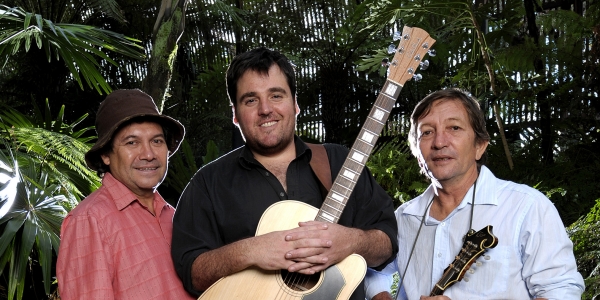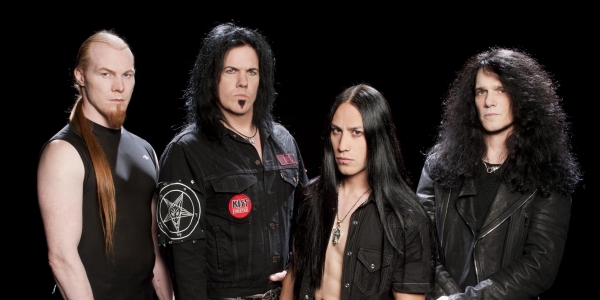The strong bond between Alan, Stephen and Alex is immediately evident. They recall particular moments of the creative process with wide grins and hearty chuckles, and complete each other’s sentences without skipping a beat. Many would assume that Stephen has a hat permanently affixed to his head, but he removes it at the start of our interview. In an ideal situation, we would be doing the interview beneath the mango tree in Alan’s backyard where a few of the soundtrack’s most poignant tracks were written.
Performing at the Sundance Film Festival in Utah – where the film and soundtrack were rapturously received – was a special experience for the trio. They performed at the famous Music Cafe as well as the incredible Egyptian Theatre in Park City. It was also The Pigram Brothers’ first trip to America and their first sighting of snow.
It was the film’s director Brendan Fletcher who not only suggested but fostered the collaboration of The Pigram Brothers and Alex Lloyd. Fletcher had already marked certain songs of theirs for the film and had previously worked with all three songwriters. “Brendan told me a lot of stories about fishing and hunting with these guys and listening to their music under the mango tree at the back of Al’s house, which always sounded very enticing to me,” Alex smiles. “So when Brendan gave me an excuse to go, I went with bells on.
“When I got there, it took me a while to settle into the lifestyle, slow down a little bit and let things happen naturally, which was a really good lesson for me. It was really good timing in my life as well – work aside, emotionally and just as a human being, and a good time for a sea change, so I was very lucky. And the collaboration worked really well – for me, I just found it very inspirational.
“We drove thousands of kilometres back and forth across the Kimberley and stopped in different communities, met and listened to people’s words, passion, country and land… that respect was given when the songs were written and that information was used as inspiration for a lot of the material, and somehow that became part of the script and weaved its way in to inspire Brendan to write specific things.
“It was four or five years of me going back and forth (Alex is currently based in London); we’d work solid for a month or so at a time as a unit. But in between, these guys were looking for characters for the film and casting actors ’cause Brendan wanted real people, not actors, and he had to listen to their stories and incorporate that into the script.”
Alex believes that collaborating with Alan and Stephen has changed him musically. “I’ve been heavily influenced by that sound, very much a Kimberley sound, but to be honest, just appreciating how good things sound stripped back,” he ascertains. “Originally, when I was younger, I used to busk and play blues in the markets with three guys and that was the sound we had and that was all we had.
“And now I’ve sorta come full circle – I’ve done the big production records and I feel like now it’s time to pull everything back and listen to the vocals, just one guitar maybe or a mandolin and ukulele… keep it simple, keep it real. I’m really enjoying where I’m at now and I love playing with these guys – they always sing from the heart and it feels good.”
The trio are proud of the way in which Mad Bastards informs Australians of the beauty and vitality of Indigenous culture. “Even when we showed it in Sundance, people got the story,” expresses Stephen. “They might not have got all of it, but they definitely got the universal story of it, which is basically a very common thing in the world – a lot of teenagers see the film and they’ve experienced that kind of dislocated upbringing. I think they really identify with all that. And unfortunately, that’s the way it is, but we wanted to present a window into that part of the world.”
Alan conveys the enchanting idea of Aboriginal people having a sixth sense – a sort of spiritual connectedness – that lies at the very heart of the film’s inspiration. “That was the hardest thing to put in there, because you can’t see it, can’t touch it,” Alan muses. “Brendan would see these things and think they were coincidental, but they weren’t (everything from characters encountered and seasonal shifts). We kept saying, ‘we can’t talk about it but somehow we gotta get it in there; I can feel that you understand it, so it’s there’.
“The Uncle Black character had to have some of that and the music is part of that. It’s this underlying feeling of magic, so that feeling – which is somewhere in that area – was planted in there. It’s a very hard thing to portray because if you chase it, it runs away and you can’t see it and then you end up in big trouble.”
The song that features most prominently in the film is Nothing Really Matters, which was fittingly written under that glorious mango tree. “I had the little tropical tune and Alex came up with the great punch-line chorus,” Stephen enthuses.
“It was all inspired by all this trouble with plot change and the usual film problems. We tried not to get too worked up over it and just thought ‘it’s a change in season’.” Whether it’s life in general or the rigours of the creative process, it’s what we learn and gain from our challenges and turmoils that define character. “It’s like someone who comes out of a period of depression,” Stephen ponders, “and actually realises that some things do matter.”

